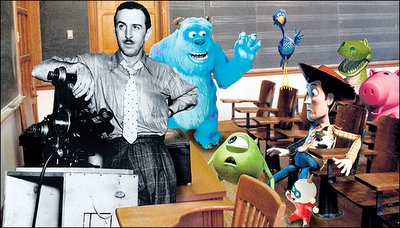
The New York Times has posted an excellent article about the way Pixar runs its studio and treats thier employees. Here is an excerpt:
Unlike a typical Oscar-winning director, however, Mr. Bird is not a free agent with his sights set on the next big-budget negotiation. He is an employee of the studio. Indeed, he is part of a group of directors and technical talents at Pixar — including Andrew Stanton and Lee Unkrich, the creators of "Finding Nemo," and Pete Doctor, the director of "Monsters, Inc." — who have staked their reputations on their work at Pixar. Again, in contrast to convention, these professionals have traded one-time contracts for long-term affiliation and contribute across the studio, rather than to just their pet projects.
According to Randy S. Nelson, who joined the company in 1997 and is dean of Pixar University, a company-run education and training operation, this model reflects "Pixar's specific critique of the industry's standard practice." He explains it this way: "Contracts allow you to be irresponsible as a company. You don't need to worry about keeping people happy and fulfilled. What we have created here — an incredible workspace, opportunities to learn and grow, and, most of all, great co-workers — is better than any contract."
There is a tough-minded business strategy behind Pixar's we're-all-in-this-together workplace. A single animated feature takes four or five years to complete, the last 18 months of which feel like a breathless sprint. In such a high-stakes environment, even the most outrageously talented individuals are bound to suffer creative setbacks. One reason Pixar has produced such a string of hits is that the organization has learned how to hang together under the pressure.
"The problem with the Hollywood model is that it's generally the day you wrap production that you realize you've finally figured out how to work together," Mr. Nelson said. "We've made the leap from an idea-centered business to a people-centered business. Instead of developing ideas, we develop people. Instead of investing in ideas, we invest in people. We're trying to create a culture of learning, filled with lifelong learners. It's no trick for talented people to be interesting, but it's a gift to be interested. We want an organization filled with interested people."
NY Times Article
Use www.bugmenot.com if you don't want to register with their site.



No comments:
Post a Comment